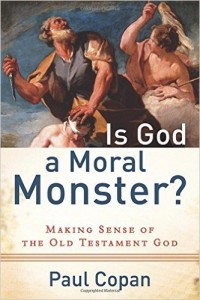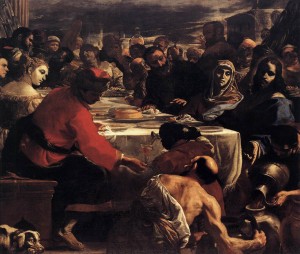If we still needed proof that the information age is the enemy of careful thought, or that memes have replaced research and argument, we need only consider that quality newspapers now run articles which report that the Bible condones rape. What was once the tactless and crude debating tactic of the internet infidel has become a trump card for members of the intelligentsia arguing for the redefinition of marriage.
Secularism wishes to keep the Judaeo-Christian world-view out of the marriage debate. Since the Bible contains Bronze and Iron Age texts, and a lot of Saturday afternoon movies depict Bronze and Iron Age cultures as vicious, ignorant and brutish, they assume that the Bible condones savage and barbaric practices. Reading the Bible with jaundiced eyes, proof-texts are plucked out of their historical, canonical and theological contexts to establish that Judaeo-Christian morality should be comfortable with incest, polygamy and rape.
 Consider the rants of Dr Valerie Tarico on the website of Britain’s Independent newspaper. She contends “that female consent is simply irrelevant in the Bible, from the time that Eve gets made from Adam’s rib onward”. Like a good fundamentalist preacher, she gathers a few scattered texts to support her conclusion.
Consider the rants of Dr Valerie Tarico on the website of Britain’s Independent newspaper. She contends “that female consent is simply irrelevant in the Bible, from the time that Eve gets made from Adam’s rib onward”. Like a good fundamentalist preacher, she gathers a few scattered texts to support her conclusion.
The Bible provides instructions on how to acquire several types of sex slaves… (Exodus 21:8).
and that
Virgin females are counted, literally, among the booty of war. (Deuteronomy 21:10-14)
She also believes that:
A Hebrew girl who is raped can be sold to her rapist for 50 shekels, or about $580 (Deuteronomy 22:28-29). He must then keep her “because she has been “humbled”.
As we will see, Deuteronomy 22: 28-29 is not referring to an instance of rape. And Deuteronomy 21 does not mention anything about war booty or sex-slaves. Israelites were generally banned from marrying outside their nation. But women from conquered nations could be married, provided they were given time to mourn, and were then granted the rights of any other wife in Israel. The entire point of the text is that such women were not to be treated as slaves or war-booty!
Most bizarrely Dr Tarico then asserts:
Lest someone claim that the Old Testament doesn’t apply to modern Bible believers, please note that none of these norms or rules—is reversed or condemned by Jesus. Quite the contrary:
“Do not think that I have come to abolish the Law or the Prophets; I have not come to abolish them but to fulfill them.”
 It’s worth taking a moment just to consider the imbecility of that claim. Jesus taught that we should love our enemies and do good to those who persecute us; that we should love others as much as we love ourselves and that compassion was better than performing the sacrifices prescribed by the Torah; that gentleness and mercy were essential for life in his Kingdom; and whatever good we wish that others would do to us, we should do to them. Instead of insisting that women hide their bodies from the male gaze, Jesus taught men should take responsibility for their own sexuality and stop treating women as objects for lust. Yet we are to believe that he would have taken a relaxed, take it or leave it attitude to rape!
It’s worth taking a moment just to consider the imbecility of that claim. Jesus taught that we should love our enemies and do good to those who persecute us; that we should love others as much as we love ourselves and that compassion was better than performing the sacrifices prescribed by the Torah; that gentleness and mercy were essential for life in his Kingdom; and whatever good we wish that others would do to us, we should do to them. Instead of insisting that women hide their bodies from the male gaze, Jesus taught men should take responsibility for their own sexuality and stop treating women as objects for lust. Yet we are to believe that he would have taken a relaxed, take it or leave it attitude to rape!
 And when the New Testament teaches that Jesus did not come to overturn the law of Moses, it obviously does not reaffirm every legal ruling given by Moses to Israel. When Jesus said he fulfilled the law he meant that he was the climax and conclusion of the story that the Old Testament was telling. Therefore, he was more important than Abraham, David, Solomon, the prophets – and Moses! His words carried greater weight. For example, Jesus advocated more stringent rules about divorce – partly to protect women from divorce laws which left them vulnerable!
And when the New Testament teaches that Jesus did not come to overturn the law of Moses, it obviously does not reaffirm every legal ruling given by Moses to Israel. When Jesus said he fulfilled the law he meant that he was the climax and conclusion of the story that the Old Testament was telling. Therefore, he was more important than Abraham, David, Solomon, the prophets – and Moses! His words carried greater weight. For example, Jesus advocated more stringent rules about divorce – partly to protect women from divorce laws which left them vulnerable!
So the Christian church did not adopt circumcision, or Jewish dietary laws, or the necessity of a Temple. Christians paid a price for abandoning these practices. While Judaism was officially tolerated by the Roman authorities, Christianity was treated with distrust. If Christians could have positioned themselves as a branch of Judaism, life would have been much easier. Furthermore, many Christians were persecuted by conservative Jewish communities for abandoning the distinctive practices prescribed by the Torah. This is because Jesus called Christians to a higher standard of righteousness.
 Indeed, the assertion that the New Testament would be comfortable with any man using any means to coerce any woman into sexual intercourse is perverse. Paul insisted that children obey their parents but, contrary to popular belief, he never asked any woman to obey her husband. Wives were called to “submit” to their husbands – but then Paul told everyone to submit to one another out of reverence for Christ. And should anyone want absolute authority over another’s body and desires he should listen to the apostle’s voice:
Indeed, the assertion that the New Testament would be comfortable with any man using any means to coerce any woman into sexual intercourse is perverse. Paul insisted that children obey their parents but, contrary to popular belief, he never asked any woman to obey her husband. Wives were called to “submit” to their husbands – but then Paul told everyone to submit to one another out of reverence for Christ. And should anyone want absolute authority over another’s body and desires he should listen to the apostle’s voice:
The wife does not have authority over her own body but yields it to her husband. In the same way, the husband does not have authority over his own body but yields it to his wife.
And Paul directly commands husbands to care for their wives as they would their own bodies and to exercise a self-giving love which mirrors Christ’s sacrifice for the Church. So the idea that Paul was uninterested in female consent is absurd, as is the idea that the New Testament would have been comfortable with sex-slavery.
 But what of those unenlightened Old Testament laws? At first glance, they may be more troubling than the good Dr Tarico realises. Deuteronomy seems to teach that a woman who is raped inside the city limits should be put to death if she did not call out for help! However, if she was raped in the countryside she is safe, because no-one would have heard her cry out. This seems monstrous and bizarre. And, thankfully, when we keep a few points in mind, it is clear that this is not what the law means.
But what of those unenlightened Old Testament laws? At first glance, they may be more troubling than the good Dr Tarico realises. Deuteronomy seems to teach that a woman who is raped inside the city limits should be put to death if she did not call out for help! However, if she was raped in the countryside she is safe, because no-one would have heard her cry out. This seems monstrous and bizarre. And, thankfully, when we keep a few points in mind, it is clear that this is not what the law means.
First of all, when we study any ancient literature, we have to interpret it within its own culture and context, not ours. Ancient law codes did not function like modern law codes. Ancient codes functioned as value systems or social visions; they did not set out exceptionless precepts. Each law gave principles which should be present in a wise ruling; each illustrated what a wise judge might do in certain circumstances, not what he must do.
Now, Deuteronomy 22:23-29 is an expansion of Exodus 22:16-17; and, to be clear, the focus of these texts is adultery, not rape. Exodus 22 merely teaches that a man and woman who have sex out of wedlock should marry; furthermore, the man is still obliged to pay the customary wedding gift to pay for the wedding. (Otherwise a little seduction could save a lot of expense!) Deuteronomy 22 repeats this point, but adds that men and women who are betrothed are married in the eyes of the law; if they sleep with others they have committed adultery, which could carry the death penalty.
 As we will see below in the discussion of Tamar’s rape, the references to women crying out for help, or not crying out for help, should not be read literally. They merely state an important principle: evidence of rape pardons the woman. It also adds that rape is as bad as murder: “it is as if a man goes against his neighbour and kills him.” (In which case, the death penalty would be mandatory and not merely optional.)
As we will see below in the discussion of Tamar’s rape, the references to women crying out for help, or not crying out for help, should not be read literally. They merely state an important principle: evidence of rape pardons the woman. It also adds that rape is as bad as murder: “it is as if a man goes against his neighbour and kills him.” (In which case, the death penalty would be mandatory and not merely optional.)
We must also note that these laws are part of a much larger literary unit which begins in Genesis and runs through to 1 and 2 Kings. Exodus picks up where Genesis left off, with 70 sons of Israel sojourning in Egypt. Exodus ends at Mount Sinai, and Leviticus takes place there; Numbers moves from Sinai to Moab. Judges picks up where Joshua ended; 1 Samuel begins as the period of the Judges ends; and so forth.Theology, plot and other inter-textual links form all these books into one Deuternomistic history.
 A great deal of skilful editorial work has taken place over the centuries and it seems certain that the editors regarded these texts as one, coherent whole. So reading this larger unit gives us some insight into how the laws should be interpreted. And, as it happens, it gives many example of faithful judges and Kings who did not follow the Torah to the letter by ruthlessly executing trespassers or Sabbath breakers. The authors and editors of the Old Testament might have wondered at Dr Tarico’s unenlightened, literalistic hermeneutic.
A great deal of skilful editorial work has taken place over the centuries and it seems certain that the editors regarded these texts as one, coherent whole. So reading this larger unit gives us some insight into how the laws should be interpreted. And, as it happens, it gives many example of faithful judges and Kings who did not follow the Torah to the letter by ruthlessly executing trespassers or Sabbath breakers. The authors and editors of the Old Testament might have wondered at Dr Tarico’s unenlightened, literalistic hermeneutic.
We can now consider how marriage and rape are portrayed in the Deuternomistic history as a whole, instead of focusing on a few isolated texts. When we do we find that although marriages were arranged between families, a just family sought the woman’s consent. Ruth and the Song of Songs both affirm female desire as essential for a good marriage (never mind “consent”!); and even King Saul seems to acknowledge that a woman should love the man she marries!
2 Samuel 13-14 relates how Tamar was raped by her half-brother Amnon. Tamar was raped in a city, but did not cry out for help. Her testimony and her psychological reaction were sufficient to establish Amnon’s guilt. So 2 Samuel did not interpret Deuteronomy 22 rigidly. This text implicitly condemns King David for not putting his son Amnon to death; because he did not apply penalty demanded by the law Tamar’s brother Absalom reverted to the logic of the blood-feud, killing Amnon in cold-blooded execution. This chain of events would eventually lead to civil war.
We could go on; but enough has been said. The modern liberal conscience might well recoil in disgust from several texts in the Bible; but that gut reaction gives not one jot of insight into their meaning; nor does it provide the slightest evidence of malign intent on their author’s behalf. Careful study and reflection is still required of anyone who would really read to understand; and a good understanding of these texts leads to the knowledge that they were anything but a “rapist’s charter”.
But if journalists and commentators merely wish to win arguments they should, by all means, proof-text to their heart’s content. But they should also know they have become the mirror image of the fundamentalists they so despise.
